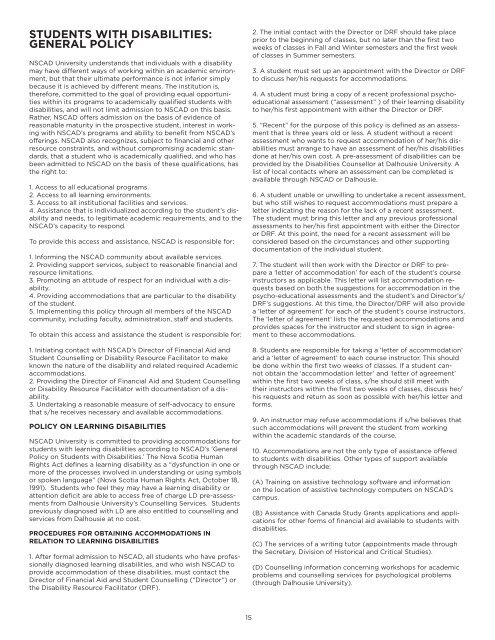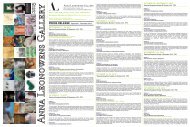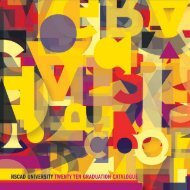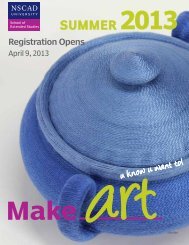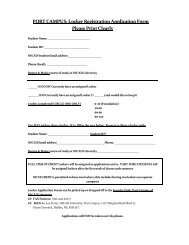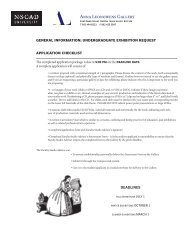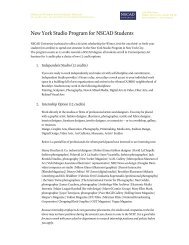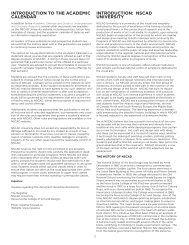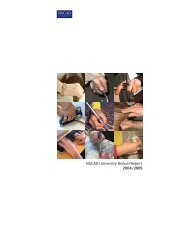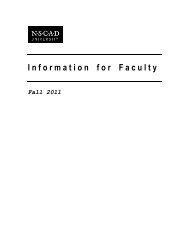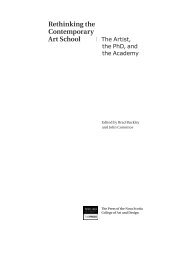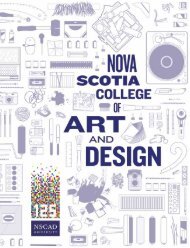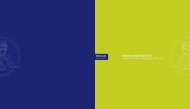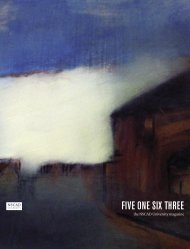CONTENTS - Nova Scotia College of Art and Design
CONTENTS - Nova Scotia College of Art and Design
CONTENTS - Nova Scotia College of Art and Design
You also want an ePaper? Increase the reach of your titles
YUMPU automatically turns print PDFs into web optimized ePapers that Google loves.
STUDENTS WITH DISABILITIES:<br />
GENERAL POLICY<br />
NSCAD University underst<strong>and</strong>s that individuals with a disability<br />
may have different ways <strong>of</strong> working within an academic environment,<br />
but that their ultimate performance is not inferior simply<br />
because it is achieved by different means. The institution is,<br />
therefore, committed to the goal <strong>of</strong> providing equal opportunities<br />
within its programs to academically qualified students with<br />
disabilities, <strong>and</strong> will not limit admission to NSCAD on this basis.<br />
Rather, NSCAD <strong>of</strong>fers admission on the basis <strong>of</strong> evidence <strong>of</strong><br />
reasonable maturity in the prospective student, interest in working<br />
with NSCAD’s programs <strong>and</strong> ability to benefit from NSCAD’s<br />
<strong>of</strong>ferings. NSCAD also recognizes, subject to financial <strong>and</strong> other<br />
resource constraints, <strong>and</strong> without compromising academic st<strong>and</strong>ards,<br />
that a student who is academically qualified, <strong>and</strong> who has<br />
been admitted to NSCAD on the basis <strong>of</strong> these qualifications, has<br />
the right to:<br />
1. Access to all educational programs.<br />
2. Access to all learning environments.<br />
3. Access to all institutional facilities <strong>and</strong> services.<br />
4. Assistance that is individualized according to the student’s disability<br />
<strong>and</strong> needs, to legitimate academic requirements, <strong>and</strong> to the<br />
NSCAD’s capacity to respond.<br />
To provide this access <strong>and</strong> assistance, NSCAD is responsible for:<br />
1. Informing the NSCAD community about available services.<br />
2. Providing support services, subject to reasonable financial <strong>and</strong><br />
resource limitations.<br />
3. Promoting an attitude <strong>of</strong> respect for an individual with a disability.<br />
4. Providing accommodations that are particular to the disability<br />
<strong>of</strong> the student.<br />
5. Implementing this policy through all members <strong>of</strong> the NSCAD<br />
community, including faculty, administration, staff <strong>and</strong> students.<br />
To obtain this access <strong>and</strong> assistance the student is responsible for:<br />
1. Initiating contact with NSCAD’s Director <strong>of</strong> Financial Aid <strong>and</strong><br />
Student Counselling or Disability Resource Facilitator to make<br />
known the nature <strong>of</strong> the disability <strong>and</strong> related required Academic<br />
accommodations.<br />
2. Providing the Director <strong>of</strong> Financial Aid <strong>and</strong> Student Counselling<br />
or Disability Resource Facilitator with documentation <strong>of</strong> a disability.<br />
3. Undertaking a reasonable measure <strong>of</strong> self-advocacy to ensure<br />
that s/he receives necessary <strong>and</strong> available accommodations.<br />
POLICY ON LEARNING DISABILITIES<br />
NSCAD University is committed to providing accommodations for<br />
students with learning disabilities according to NSCAD’s ‘General<br />
Policy on Students with Disabilities.’ The <strong>Nova</strong> <strong>Scotia</strong> Human<br />
Rights Act defines a learning disability as a “dysfunction in one or<br />
more <strong>of</strong> the processes involved in underst<strong>and</strong>ing or using symbols<br />
or spoken language” (<strong>Nova</strong> <strong>Scotia</strong> Human Rights Act, October 18,<br />
1991). Students who feel they may have a learning disability or<br />
attention deficit are able to access free <strong>of</strong> charge LD pre-assessments<br />
from Dalhousie University’s Counselling Services. Students<br />
previously diagnosed with LD are also entitled to counselling <strong>and</strong><br />
services from Dalhousie at no cost.<br />
PROCEDURES FOR OBTAINING ACCOMMODATIONS IN<br />
RELATION TO LEARNING DISABILITIES<br />
1. After formal admission to NSCAD, all students who have pr<strong>of</strong>essionally<br />
diagnosed learning disabilities, <strong>and</strong> who wish NSCAD to<br />
provide accommodation <strong>of</strong> these disabilities, must contact the<br />
Director <strong>of</strong> Financial Aid <strong>and</strong> Student Counselling (“Director”) or<br />
the Disability Resource Facilitator (DRF).<br />
15<br />
2. The initial contact with the Director or DRF should take place<br />
prior to the beginning <strong>of</strong> classes, but no later than the first two<br />
weeks <strong>of</strong> classes in Fall <strong>and</strong> Winter semesters <strong>and</strong> the first week<br />
<strong>of</strong> classes in Summer semesters.<br />
3. A student must set up an appointment with the Director or DRF<br />
to discuss her/his requests for accommodations.<br />
4. A student must bring a copy <strong>of</strong> a recent pr<strong>of</strong>essional psychoeducational<br />
assessment (“assessment” ) <strong>of</strong> their learning disability<br />
to her/his first appointment with either the Director or DRF.<br />
5. “Recent” for the purpose <strong>of</strong> this policy is defined as an assessment<br />
that is three years old or less. A student without a recent<br />
assessment who wants to request accommodation <strong>of</strong> her/his disabilities<br />
must arrange to have an assessment <strong>of</strong> her/his disabilities<br />
done at her/his own cost. A pre-assessment <strong>of</strong> disabilities can be<br />
provided by the Disabilities Counsellor at Dalhousie University. A<br />
list <strong>of</strong> local contacts where an assessment can be completed is<br />
available through NSCAD or Dalhousie.<br />
6. A student unable or unwilling to undertake a recent assessment,<br />
but who still wishes to request accommodations must prepare a<br />
letter indicating the reason for the lack <strong>of</strong> a recent assessment.<br />
The student must bring this letter <strong>and</strong> any previous pr<strong>of</strong>essional<br />
assessments to her/his first appointment with either the Director<br />
or DRF. At this point, the need for a recent assessment will be<br />
considered based on the circumstances <strong>and</strong> other supporting<br />
documentation <strong>of</strong> the individual student.<br />
7. The student will then work with the Director or DRF to prepare<br />
a ‘letter <strong>of</strong> accommodation’ for each <strong>of</strong> the student’s course<br />
instructors as applicable. This letter will list accommodation requests<br />
based on both the suggestions for accommodation in the<br />
psycho-educational assessments <strong>and</strong> the student’s <strong>and</strong> Director’s/<br />
DRF’s suggestions. At this time, the Director/DRF will also provide<br />
a ‘letter <strong>of</strong> agreement’ for each <strong>of</strong> the student’s course instructors.<br />
The ‘letter <strong>of</strong> agreement’ lists the requested accommodations <strong>and</strong><br />
provides spaces for the instructor <strong>and</strong> student to sign in agreement<br />
to these accommodations.<br />
8. Students are responsible for taking a ‘letter <strong>of</strong> accommodation’<br />
<strong>and</strong> a ‘letter <strong>of</strong> agreement’ to each course instructor. This should<br />
be done within the first two weeks <strong>of</strong> classes. If a student cannot<br />
obtain the ‘accommodation letter’ <strong>and</strong> ‘letter <strong>of</strong> agreement’<br />
within the first two weeks <strong>of</strong> class, s/he should still meet with<br />
their instructors within the first two weeks <strong>of</strong> classes, discuss her/<br />
his requests <strong>and</strong> return as soon as possible with her/his letter <strong>and</strong><br />
forms.<br />
9. An instructor may refuse accommodations if s/he believes that<br />
such accommodations will prevent the student from working<br />
within the academic st<strong>and</strong>ards <strong>of</strong> the course.<br />
10. Accommodations are not the only type <strong>of</strong> assistance <strong>of</strong>fered<br />
to students with disabilities. Other types <strong>of</strong> support available<br />
through NSCAD include:<br />
(A) Training on assistive technology s<strong>of</strong>tware <strong>and</strong> information<br />
on the location <strong>of</strong> assistive technology computers on NSCAD’s<br />
campus.<br />
(B) Assistance with Canada Study Grants applications <strong>and</strong> applications<br />
for other forms <strong>of</strong> financial aid available to students with<br />
disabilities.<br />
(C) The services <strong>of</strong> a writing tutor (appointments made through<br />
the Secretary, Division <strong>of</strong> Historical <strong>and</strong> Critical Studies).<br />
(D) Counselling information concerning workshops for academic<br />
problems <strong>and</strong> counselling services for psychological problems<br />
(through Dalhousie University).


